Filter by
# Debug Box
/var/www/htdocs/pustaka-digital/lib/SearchEngine/SearchBiblioEngine.php:688 "Search Engine Debug 🔎 🪲"
Engine Type ⚙️: "SLiMS\SearchEngine\SearchBiblioEngine"
SQL ⚙️: array:2 [ "count" => "select count(sb.biblio_id) from search_biblio as sb where sb.opac_hide=0 and ((match (sb.topic) against (:subject in boolean mode)))" "query" => "select sb.biblio_id, sb.title, sb.author, sb.topic, sb.image, sb.isbn_issn, sb.publisher, sb.publish_place, sb.publish_year, sb.labels, sb.input_date, sb.edition, sb.collation, sb.series_title, sb.call_number from search_biblio as sb where sb.opac_hide=0 and ((match (sb.topic) against (:subject in boolean mode))) order by sb.last_update desc limit 10 offset 0" ]
Bind Value ⚒️: array:1 [ ":subject" => "'+\"Management\"'" ]

Principles of knowledge auditing: foundations for knowledge management implem…
A comprehensive theoretical and practical guide to the operating principles of knowledge auditing, illustrated with numerous case studies. A knowledge audit provides an “at a glance” view of an organization's needs and opportunities. Its purpose is to improve an organization's effectiveness through a better understanding of the dynamics and levers of knowledge production, access, and use…
- Edition
- -
- ISBN/ISSN
- 9780262373166
- Collation
- xi, 410 p : ill.
- Series Title
- -
- Call Number
- 658.4038 LAM p
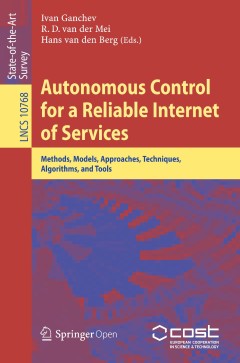
Autonomous control for a reliable internet of services : methods, models, app…
This open access book was prepared as a Final Publication of the COST Action IC1304 “Autonomous Control for a Reliable Internet of Services (ACROSS)”. The book contains 14 chapters and constitutes a show-case of the main outcome of the Action in line with its scientific goals. It will serve as a valuable reference for undergraduate and post-graduate students, educators, faculty members, res…
- Edition
- -
- ISBN/ISSN
- 9783319904153
- Collation
- xvi, 400p. : ill.
- Series Title
- -
- Call Number
- 004.678 AUT a
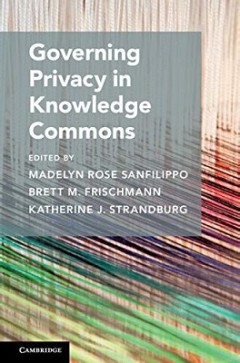
Governing privacy in knowledge commons
Privacy, in contrast with secrecy, is a relational concept, achieved when personal information is shared appropriately between actors. Viewed in this way, privacy is necessarily contextual and complex because norms about appropriate flows and use of personal information are socially negotiated and often contested. (Nissenbaum, 2009) Privacy is thus a problem of collective action. Moreover, pers…
- Edition
- -
- ISBN/ISSN
- 9781108749978
- Collation
- xi, 289 pages; illustration
- Series Title
- Cambridge studies on governing knowledge commons
- Call Number
- 342.08 SAN g

Higher education institutions and digital transformation: building university…
"The growing complexity, fluidity and instability of the environment as well as changing needs are challenges that both enterprises and higher education institutions must face. Higher education institutions understand that their key product, i.e. knowledge, is a value that can and should be offered to enterprises in a desirable form as a key to innovation and development as well as the basis of…
- Edition
- -
- ISBN/ISSN
- 9781003363132
- Collation
- xii, 222 pages : illustrations ; 24 cm.
- Series Title
- Routledge open business and economics
- Call Number
- 378.1 LIS h

Fishing for fairness : poverty, morality and marine resource regulation in th…
Fishing for Fairness develops an explicitly cultural perspective on environmental politics in the Philippines by analysing the responses of fishers to marine resource regulations. In the resource frontier of the Calamianes Islands, fishing, conservation and tourism provide the context where competing visions of how to engage with marine resources are played out. The book draws on data from ethn…
- Edition
- -
- ISBN/ISSN
- 9781921862663
- Collation
- viii, 223p.; ill.
- Series Title
- Asia-Pacific environment monographs
- Call Number
- 333.91609599 FAB f
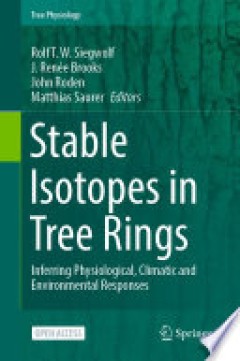
Stable isotopes in tree rings : inferring physiological, climatic and environ…
This Open Access volume highlights how tree ring stable isotopes have been used to address a range of environmental issues from paleoclimatology to forest management, and anthropogenic impacts on forest growth. It will further evaluate weaknesses and strengths of isotope applications in tree rings. In contrast to older tree ring studies, which predominantly applied a pure statistical approach t…
- Edition
- 1
- ISBN/ISSN
- 9783030926984
- Collation
- XXI, 773 p. : ill.
- Series Title
- Tree Physiology
- Call Number
- 582.16 SIE s
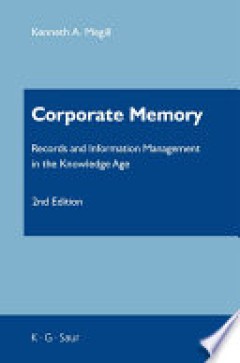
Corporate memory : records and information management in the knowledge age
Corporate memory' is the body of information that an organization needs to keep for re-use. It is the active and historical information that an organization has that is worth sharing, managing and preserving to enable it to function effectively. This book is aimed at records managers and archivists, who are responsible for maintaining and managing information within an organization. It describe…
- Edition
- 32
- ISBN/ISSN
- 9783598440113
- Collation
- xi, 156 p
- Series Title
- -
- Call Number
- 658.4038 KEN c

Information security governance simplified : from the boardroom to the keyboard
Security practitioners must be able to build cost-effective security programs while also complying with government regulations. Information Security Governance Simplified: From the Boardroom to the Keyboard lays out these regulations in simple terms and explains how to use control frameworks to build an air-tight information security (IS) program and governance structure. Defining the leadershi…
- Edition
- -
- ISBN/ISSN
- 9781439811634
- Collation
- xxvii, 433 p
- Series Title
- -
- Call Number
- 005.8

Quality Management and Accounting in Service Industries : A New Model of Qual…
The process of globalisation in world markets and the growing number of enterprises competing with one another in terms of the products and services they offer, naturally leads to the improved efficiency of management systems. Efficiency is required in order for these entities to maintain competitiveness. To assess the efficiency of their management systems, enterprises use quality cost calcula…
- Edition
- -
- ISBN/ISSN
- 9781032229843
- Collation
- xi, 208 p
- Series Title
- Routledge Studies in Accounting,
- Call Number
- 354.68 SAD
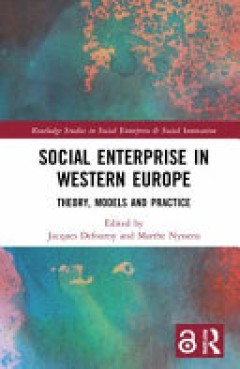
Social Enterprise in Western Europe : Theory, Models and Practice
In the last two decades, the quest for a widely accepted definition of social enterprise has been a central issue in a great number of publications. The main objective of the ICSEM Project on which this book is based was to show that the social enterprise field would benefit much more from linking conceptualisation efforts to the huge diversity of social enterprises than from an additional and …
- Edition
- -
- ISBN/ISSN
- 9780429621772
- Collation
- ix, 368 p
- Series Title
- Routledge Studies in Social Enterprise & Social Innovation
- Call Number
- 338.6094 DEF s
 Computer Science, Information & General Works
Computer Science, Information & General Works  Philosophy & Psychology
Philosophy & Psychology  Religion
Religion  Social Sciences
Social Sciences  Language
Language  Pure Science
Pure Science  Applied Sciences
Applied Sciences  Art & Recreation
Art & Recreation  Literature
Literature  History & Geography
History & Geography